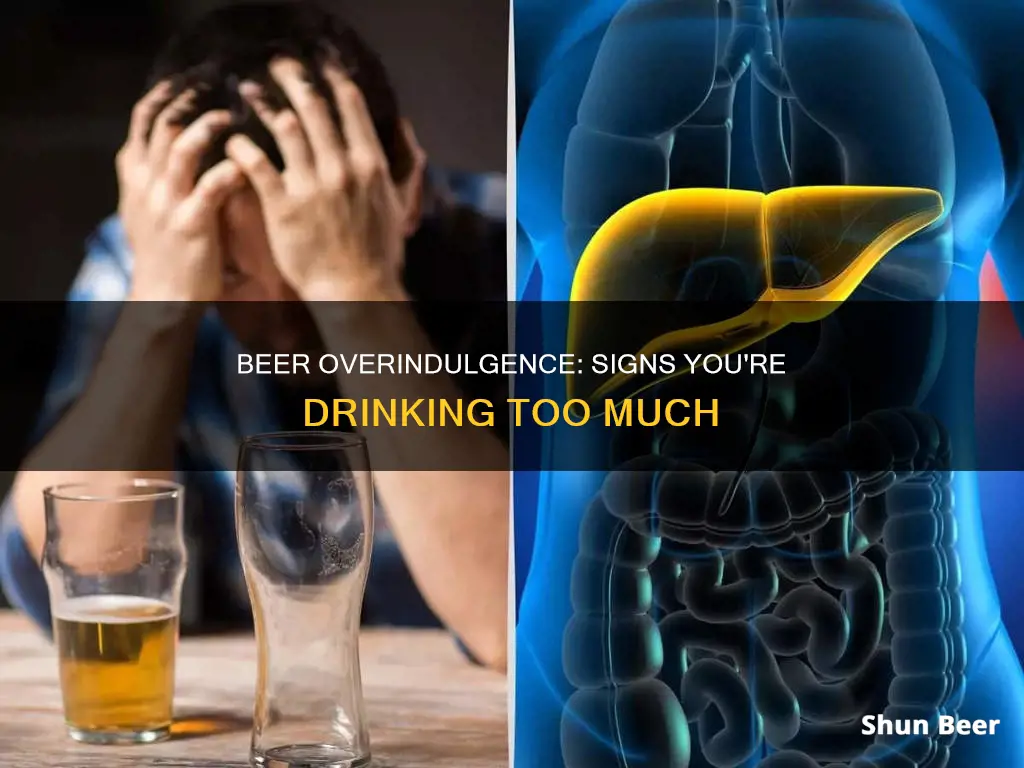
Drinking beer can be a relaxing way to unwind after a long day, but it's important to be mindful of the amount you consume. Excessive beer drinking can lead to negative health consequences and impact your overall well-being. While enjoying a beer or two may seem harmless, regularly drinking larger amounts can result in short- and long-term health issues. So, what are the signs that you might be overindulging in this popular alcoholic beverage?
| Characteristics | Values |
|---|---|
| Skin complexion | Duller skin, reduced elasticity, puffy or swollen eyes, intensified wrinkles and dark circles |
| Weight | Weight gain or loss |
| Appetite | Loss of appetite |
| Tingling or numbness | In feet, legs or hands |
| Heartburn | Acid reflux |
| Sleep | Disrupted sleep |
| Immune system | More prone to illness |
| Sweating | Night sweats |
| Eyes | Yellowing |
| Sexual health | Erectile dysfunction |
| Digestion | Bloating, gassiness, constipation, diarrhoea |
| Mental health | Anxiety |
What You'll Learn
- Skin changes: dehydration, inflammation, dullness, reduced elasticity, swollen eyes, and intensified wrinkles
- Heartburn: alcohol increases stomach acid and can irritate the stomach lining
- Fatigue and low energy: alcohol disrupts sleep and is a diuretic
- Weight gain: alcohol prevents the body from burning carbs and fats efficiently and stimulates appetite
- Tingling or numbness: overdrinking can lead to alcoholic neuropathy

Skin changes: dehydration, inflammation, dullness, reduced elasticity, swollen eyes, and intensified wrinkles
Excessive beer consumption can have a detrimental effect on the skin, causing dehydration, inflammation, dullness, reduced elasticity, swollen eyes, and intensified wrinkles.
Alcohol is a diuretic, which means that it increases the production of urine and leads to dehydration. This loss of fluids and nutrients can cause the skin to become dehydrated, dull, and grey, or bloated and puffy. Dehydration also leads to a breakdown of collagen and elastin fibres, which accelerates the formation of fine lines and wrinkles.
In addition to dehydration, alcohol also causes inflammation in the body, including the skin. This inflammation can manifest as redness or flushing of the skin, particularly on the face. Over time, this can lead to permanent facial redness. Alcohol can also flare up skin conditions such as rosacea and psoriasis, and make the skin more prone to certain types of eczema.
The combination of dehydration and inflammation caused by alcohol consumption can result in reduced skin elasticity. This means that the skin may appear less firm and supple, and may be more prone to sagging and wrinkles.
Alcohol can also cause swelling or puffiness around the eyes, making them appear swollen or puffy. This may be due to the diuretic effect of alcohol, which can lead to fluid retention in certain areas of the body.
The wrinkles caused by dehydration and inflammation can become more intense and prominent over time, especially if alcohol consumption is frequent and occurs over a long period.
While the skin has a great ability to regenerate, the damage caused by alcohol can be difficult to reverse, especially if the consumption has been long-term. However, reducing alcohol intake and increasing hydration can help to improve the skin's appearance and overall health.
Beer and Klonopin: A Dangerous Mix?
You may want to see also

Heartburn: alcohol increases stomach acid and can irritate the stomach lining
Drinking beer or any alcoholic beverage can have adverse effects on the body, and it's important to know when you're drinking too much. While enjoying a beer after a long workday can be relaxing, drinking three or four beers regularly can be harmful to your health.
Heartburn, or acid reflux, is the burning sensation in the chest caused by stomach acid travelling back up the oesophagus towards the throat. Alcohol increases stomach acid and can irritate the stomach lining, causing heartburn. Even small amounts of alcohol can irritate the stomach lining and lead to bloating, burping, hiccupping, and pain in the upper stomach.
Alcohol can cause the stomach to produce more acid than usual, which, over time, can wear away at the stomach lining, causing inflammation and pain (gastritis). Acute gastritis can cause a sudden onset of severe symptoms, while chronic gastritis can lead to long-lasting discomfort and increase the risk of developing stomach ulcers, polyps, or tumours.
To prevent alcohol-induced heartburn, it is recommended to limit alcohol consumption to one drink or less for women and two drinks or less for men on any single day. Drinking less alcohol overall will reduce the risk of negative effects on the stomach. It is also advisable to have several drink-free days every week and avoid binge drinking.
If you experience frequent heartburn, making lifestyle changes such as reducing alcohol intake, avoiding spicy and acidic foods, and quitting smoking can help alleviate symptoms. Over-the-counter antacids can also provide temporary relief from heartburn. However, if symptoms persist or become severe, it is important to consult a doctor.
Drinking Beer: How Much Is Too Much in an Hour?
You may want to see also

Fatigue and low energy: alcohol disrupts sleep and is a diuretic
Drinking too much beer can lead to fatigue and low energy due to disrupted sleep and dehydration. Alcohol is a diuretic, which means it increases urine production and the need to go to the bathroom. This can cause frequent trips to the toilet at night, disrupting your sleep.
Alcohol affects your sleep by altering your sleep architecture, or how your body cycles through the four stages of sleep. It increases the amount of "deep sleep" (N3 sleep) and decreases REM sleep, which is vital for memory consolidation and learning. Later in the night, once your body has metabolized the alcohol, you're likely to experience more frequent wakings and fragmented sleep.
Additionally, alcohol inhibits the production of the hormone vasopressin, which regulates water excretion. Usually, vasopressin signals your kidneys to reabsorb water if your body needs it. However, alcohol interferes with this signal, leading to increased urine production and the potential for dehydration if fluid intake is not increased.
To reduce the impact of alcohol on your sleep and energy levels, it's recommended to avoid drinking at least three hours before bedtime. Limiting your overall alcohol intake, especially before bed, can help you wake up feeling more rested and energized.
Beer and IBS: Is There a Link?
You may want to see also

Weight gain: alcohol prevents the body from burning carbs and fats efficiently and stimulates appetite
Weight gain is one of the most common signs of excessive alcohol consumption. Alcohol prevents the body from burning carbs and fats efficiently, and stimulates appetite, which can lead to weight gain in several ways.
Firstly, alcohol is calorie-dense and contains more calories than most nutritious proteins, grains, and dairy products. As a result, the body prioritises metabolising alcohol over other fuel sources. This means that when you drink, your body stops burning fat until those alcohol calories are burned off. The by-product of alcohol metabolism, acetate, is toxic, so the body will shut down all other metabolic pathways until the alcohol is out of your system. This can take up to 36 hours, during which time your body will not be burning any fat.
Secondly, drinking alcohol can increase your appetite. Alcohol is high in sugar, and the more you drink, the more your brain and body will crave more food, especially foods that will quickly increase your blood sugar levels, like low-fibre starches. The dehydration and electrolyte imbalance caused by drinking also increase cravings for salty foods. The more food you consume, especially food with limited nutritional value, the more calories your body has to work through before it can return to burning fat.
Thirdly, drinking can easily push you over your daily calorie budget. Alcoholic drinks often contain carbohydrates and sugar, and when combined with the increased appetite and decreased fat-burning efficiency that alcohol causes, this can lead to a caloric surplus and weight gain.
Finally, alcohol affects muscle growth and sleep quality. This can lead to a poorer ratio of muscle gain to fat gain, and decreased recovery, which can also contribute to weight gain.
Plato's Beer: The Science Behind It
You may want to see also

Tingling or numbness: overdrinking can lead to alcoholic neuropathy
Drinking too much beer can lead to a range of health issues, and one of the warning signs that you've been overdrinking is tingling or numbness in the body. This is a symptom of alcoholic neuropathy, a condition that results from damage to the nerves due to excessive alcohol consumption. Alcoholic neuropathy is also referred to as alcohol-related neuropathy to reduce the stigma surrounding the condition.
Alcoholic neuropathy is characterised by damage to the peripheral nerves, which are responsible for transmitting signals between the body, spinal cord, and brain. These nerves facilitate essential sensory and motor functions, such as feeling pain and touch, moving your arms and legs, and controlling your bladder and bowel.
The exact causes of alcoholic neuropathy are not fully understood, but researchers have found a strong link between long-term excessive alcohol consumption and nerve damage. One way this occurs is through malnutrition, as alcohol interferes with the body's ability to absorb essential vitamins and nutrients that are crucial for nerve health, such as vitamin B1 (thiamine) and other B vitamins. Chronic alcohol consumption can also lead to oxidative stress and inflammation, causing damage to the myelin sheath surrounding the nerves (demyelination) and important neurons (axonal degeneration).
The symptoms of alcoholic neuropathy typically affect the lower limbs and may include numbness and tingling, muscle spasms and cramps, loss of balance or coordination, and problems with urination. In more severe cases, it can affect the upper body and vital organs. Other possible symptoms include a rapid heartbeat (tachycardia), dizziness or lightheadedness, muscle weakness and wasting, and difficulties with swallowing.
If you experience any symptoms of alcoholic neuropathy, it is crucial to consult a healthcare professional as early as possible. Early diagnosis and treatment can increase your chances of a full recovery. The most important step in treating alcoholic neuropathy is to stop consuming alcohol. This may involve seeking support from alcohol addiction specialists, support groups, or psychotherapy. Additionally, vitamin supplements, pain relief medications, and physical therapy can help manage symptoms and improve your overall health.
Lesbians, Beer, and Cans: Exploring Beverage Preferences
You may want to see also
Frequently asked questions
Drinking too much beer can lead to several short- and long-term health issues. The National Institute on Alcohol Abuse and Alcoholism (NIAAA) defines "at-risk" drinking as three drinks per day for women and four drinks per day for men. Drinking more than this can cause weight gain, pancreatitis, heart problems, high blood pressure, a weakened immune system, and a damaged liver.
According to the NIAAA, drinking more than seven drinks per week for women and 14 drinks per week for men puts you at a higher risk of developing alcohol use disorder.
Alcohol dependence is a serious condition that can develop if you're drinking more than the recommended amount. Signs of alcohol dependence include a strong craving for alcohol, loss of control over drinking, and continued drinking despite negative consequences. If you think you may be dependent on alcohol, it's important to seek professional help.
If you're regularly exceeding the low-risk drinking guidelines, it's a sign that you may be drinking too much. It's important to monitor your alcohol consumption and be aware of the potential risks associated with excessive drinking.







